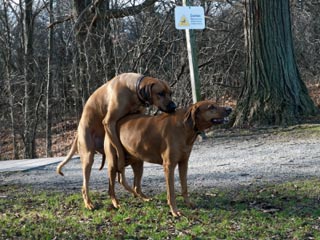
Desexing renders dogs and bitches unable to breed, and removes the sexual urge. Temporary or semi-permanent control can be effected by the use of certain drugs, however surgical desexing is permanent and has fewer side effects.
Desexing dogs is compulsory in the ACT unless you have a permit to keep your pet entire. If you do not intend to breed from your dog surgical desexing has undoubted advantages both in the male and the female. In the male dog it removes the sexual urge and lessens their urge to roam. Desexing the bitch means she will not come into heat and therefore will not have to be confined and deprived of her usual exercise and companionship. Heat usually occurs twice a year for at least 3 weeks each time.
Owners are often tempted to have at least one litter from a bitch as there appears to be a general misconception that having a litter will improve temperament. There is no scientific evidence to support this theory. It has however, been proven that neutering the bitch not only prevents uterine disease but also reduces the possibility of mammary cancer if desexing occurs before the first heat. Bitches on heat (oestrus) often surprise their owners with their determined and often successful attempts to escape to be mated. Once desexed the bitch will have no oestrus and will not have unwanted puppies or phantom pregnancies, which in some bitches causes as lot of distress.
Both female and male dogs are usually desexed between 6–12 months of age although the operation can be carried out at any time. In the male, desexing entails removal of the testicles. Occasionally one or both testicles have failed to descend into the scrotum, desexing these dogs is more complicated but well advised, as testicles retained within the abdomen are more vulnerable to tumour development later in life. The desexing of females is less complicated when they are not on heat, pregnant or overweight. We recommend bitches be desexed closer to six months of age, when the immaturity of the ovaries and uterus facilitates their easier removal.
The desexing procedure is done under general anesthesia so the dog must be fasted for 12 hours prior to surgery. General anaesthesia always carries a slight risk but with modern anaesthetic agents, careful monitoring by qualified nurses and intravenous fluids this risk is minimal. The dog will be examined by a veterinarian on admission to the hospital prior to receiving a premedication. This is the time to discuss any remaining questions and inform the veterinarian if your dog is not in peak health. The surgery is performed during the morning and your dog remains in hospital under observation for the afternoon. We will discuss after care and the use of post op pain relief with you at the time of discharge and call to check on your pet’s progress the following day.

 The hormone testosterone takes about a month to decline after castration. Once it is out of the system desexed male dogs are less likely to wander and have no interest in bitches on heat. Because they escape or wander less they are less likely to get run over, get involved in fights or lift their legs on every post.
The hormone testosterone takes about a month to decline after castration. Once it is out of the system desexed male dogs are less likely to wander and have no interest in bitches on heat. Because they escape or wander less they are less likely to get run over, get involved in fights or lift their legs on every post.